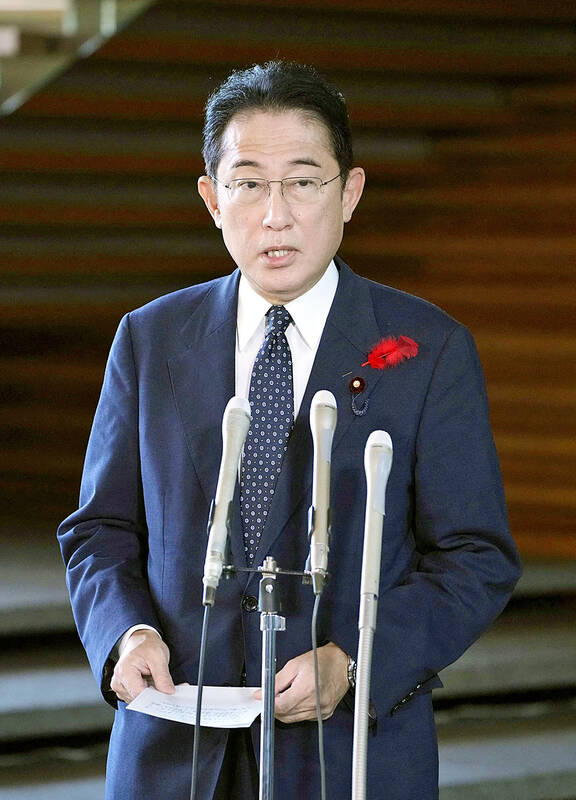Japanese Prime Minister Fumio Kishida appointed his son as a senior political aide, sparking speculation that the 31-year-old was being groomed as an eventual successor and prompting criticism of nepotism.
Shotaro, the oldest of Kishida’s three sons, was named executive secretary to the prime minister, government spokesman Hirokazu Matsuno said yesterday, adding that the appointment was appropriate.
“Appointments are about putting the right person in the right role based on character and expertise, and I believe this one is no different,” he told a regular press briefing.

Photo: Reuters / Kyodo
The move places Shotaro, already a member of Kishida’s staff, within a small group that follows the prime minister almost everywhere, including meetings with world leaders, and is involved in behind-the-scenes political negotiations.
Public broadcaster NHK said the older Kishida was likely preparing his son for eventual succession by exposing him to high-level policymaking, while critics said the nation’s leadership was increasingly controlled by powerful dynasties.
“This is, essentially, preferential treatment for family,” Yuichiro Tamaki, the head of the opposition Democratic Party for the People, was quoted as saying by Kyodo News.
While placing family members in influential government positions is not rare, even among democracies, hereditary politics is particularly entrenched in Japan.
Prime Minister Kishida himself hails from a long line of lawmakers in Hiroshima. His predecessor, Yoshihide Suga, the son of a strawberry farmer, was the only leader of the ruling Liberal Democratic Party (LDP) in the past two decades who did not come from a political family.
Kishida’s approval ratings have already been falling due to rising living costs and distrust over the LDP’s ties with the Unification Church, which has a long list of court judgements against it in Japan over its fundraising methods.
Before joining Kishida’s personal office, Shotaro worked at a major trading house, NHK said.
He becomes one of eight executive secretaries, including six career bureaucrats, working for the prime minister.

FRAUD ALLEGED: The leader of an opposition alliance made allegations of electoral irregularities and called for a protest in Tirana as European leaders are to meet Albanian Prime Minister Edi Rama’s Socialist Party scored a large victory in parliamentary elections, securing him his fourth term, official results showed late on Tuesday. The Socialist Party won 52.1 percent of the vote on Sunday compared with 34.2 percent for an alliance of opposition parties led by his main rival Sali Berisha, according to results released by the Albanian Central Election Commission. Diaspora votes have yet to be counted, but according to initial results, Rama was also leading there. According to projections, the Socialist Party could have more lawmakers than in 2021 elections. At the time, it won 74 seats in the

EUROPEAN FUTURE? Albanian Prime Minister Edi Rama says only he could secure EU membership, but challenges remain in dealing with corruption and a brain drain Albanian Prime Minister Edi Rama seeks to win an unprecedented fourth term, pledging to finally take the country into the EU and turn it into a hot tourist destination with some help from the Trump family. The artist-turned-politician has been pitching Albania as a trendy coastal destination, which has helped to drive up tourism arrivals to a record 11 million last year. US President Donald Trump’s son-in-law, Jared Kushner, also joined in the rush, pledging to invest US$1.4 billion to turn a largely deserted island into a luxurious getaway. Rama is expected to win another term after yesterday’s vote. The vote would

A Croatian town has come up with a novel solution to solve the issue of working parents when there are no public childcare spaces available: pay grandparents to do it. Samobor, near the capital, Zagreb, has become the first in the country to run a “Grandmother-Grandfather Service,” which pays 360 euros (US$400) a month per child. The scheme allows grandparents to top up their pension, but the authorities also hope it will boost family ties and tackle social isolation as the population ages. “The benefits are multiple,” Samobor Mayor Petra Skrobot told reporters. “Pensions are rather low and for parents it is sometimes

CANCER: Jose Mujica earned the moniker ‘world’s poorest president’ for giving away much of his salary and living a simple life on his farm, with his wife and dog Tributes poured in on Tuesday from across Latin America following the death of former Uruguayan president Jose “Pepe” Mujica, an ex-guerrilla fighter revered by the left for his humility and progressive politics. He was 89. Mujica, who spent a dozen years behind bars for revolutionary activity, lost his battle against cancer after announcing in January that the disease had spread and he would stop treatment. “With deep sorrow, we announce the passing of our comrade Pepe Mujica. President, activist, guide and leader. We will miss you greatly, old friend,” Uruguayan President Yamandu Orsi wrote on X. “Pepe, eternal,” a cyclist shouted out minutes later,